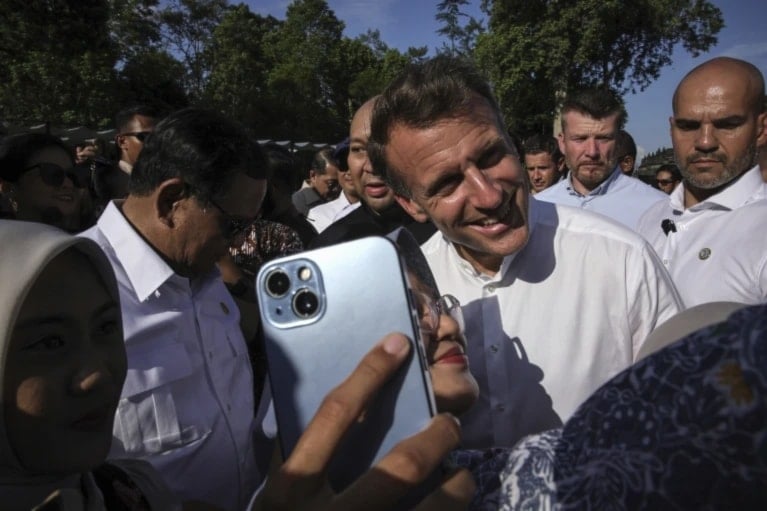EU must toughen 'Israel' stance unless Gaza crisis eases: Macron
Macron warns of sanctions and stresses Palestinian statehood as a political necessity.
-

France's President Emmanuel Macron poses for a picture during a visit to Borobudur Temple, in Magelang, Central Java, May 29, 2025. (AP)
French President Emmanuel Macron said on Friday that European nations must “harden the collective position” against “Israel” if the humanitarian catastrophe in Gaza is not urgently addressed.
Speaking from Singapore during a Southeast Asian diplomatic tour, Macron warned that action was needed “in the next few hours and days” as international concern deepens over starvation and the collapse of basic services in the besieged enclave.
“If there is no response in line with the humanitarian situation in Gaza in the coming hours and days, we will have to harden our collective position,” Macron said. That includes abandoning the assumption that human rights are being respected and applying sanctions, he added.
The US president's remarks reflect mounting European unease over the deteriorating situation in Gaza, where more than eight months of relentless Israeli aggression and a tightened blockade have pushed the civilian population to the brink.
Food insecurity now threatens one in five people, according to international experts cited by Macron and others.
During his Singapore stop, Macron did not specify what form the hardened position would take, but his mention of sanctions marks one of the strongest statements yet from a European head of state regarding accountability measures directed at the Israeli regime.
His comments echo increasing calls within the European Union for a reassessment of diplomatic and trade relations with “Israel” amid growing accusations of genocide and violations of international law.
Southeast Asia tour highlights Macron’s diplomatic agenda
Macron’s call came just hours before he addressed a defense summit in Singapore, part of a wider diplomatic mission across Southeast Asia that also took him to Indonesia and Vietnam.
While in Jakarta, Macron and Indonesian President Prabowo Subianto issued a joint statement condemning “Israel’s” intentions to maintain control over Gaza and any attempt to forcibly displace Palestinians from their land.
The statement, made alongside the region’s most populous Muslim-majority country, represents a coordinated diplomatic push by France to address what Macron called "not only a moral duty, but a political necessity," in reference to the recognition of a Palestinian state with conditions.
While reaffirming France’s long-standing support for a "two-state solution", Macron said that the international community must now move toward concrete recognition of a Palestinian state. “It is not only a moral duty but a political necessity,” he stressed, citing the need to resolve the root causes of the situation.
According to Macron, such recognition would be contingent on several conditions, including the demilitarization of Hamas and acknowledgment of “Israel’s” right to "exist and defend itself," a position that seeks to balance France’s traditional diplomatic line with a more assertive response to the current Gaza crisis.
France, Indonesia jointly denounce Israeli plans
As part of their joint statement in Indonesia, Macron and Prabowo condemned any effort by “Israel” to occupy Gaza or alter its demographic composition through forced displacement.
The move further underscores France’s pivot toward engaging regional powers in the Global South in a bid to reshape international consensus on Gaza and Palestinian statehood.
Despite limited aid deliveries entering Gaza after a two-month-long Israeli blockade, conditions remain dire. Macron’s comments have placed added pressure on “Israel” to lift restrictions, facilitate humanitarian access, and allow for meaningful international oversight.
Meanwhile, the Israeli regime has intensified its military campaign after reneging on the ceasefire agreement in Gaza, resulting in a staggering humanitarian toll. Macron's stances, stemming from the consequent dire situation in the Strip, highlight a potential turning point in Europe's stance, which may soon involve concrete punitive measures if no relief is forthcoming.

 4 Min Read
4 Min Read










